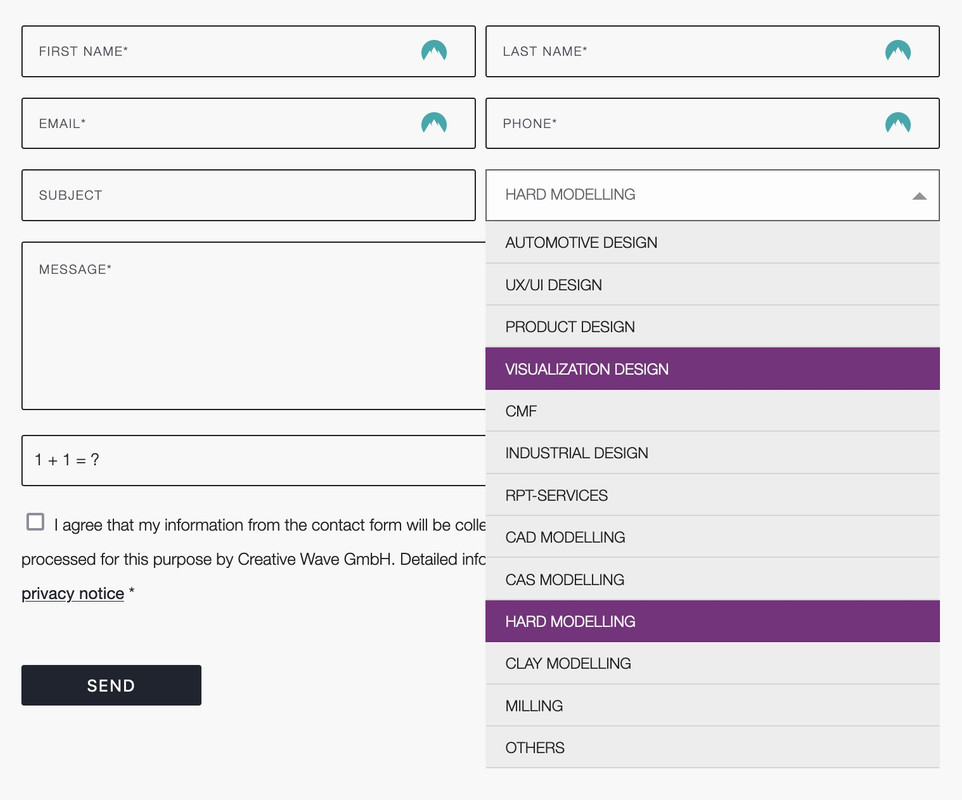May 22, 2024 at 12:38 am
#1445022
you can only influence the select box ( as check boxes, radio buttons etc. ) by replacing the original html by a different html structure.
put this to your child-theme functions.php:
( it is specific to your form – because the selector for that form element is given by the ID: #element_avia_6_1
on other form elements it might be a different ID )
function style_select_options(){
?>
<script>
window.addEventListener("DOMContentLoaded", function () {
(function($) {
$('.avia_ajax_form #element_avia_6_1').addClass('custom-select');
})(jQuery);
var x, i, j, l, ll, selElmnt, a, b, c;
/* Look for any elements with the class "custom-select": */
x = document.getElementsByClassName("custom-select");
l = x.length;
for (i = 0; i < l; i++) {
selElmnt = x[i].getElementsByTagName("select")[0];
ll = selElmnt.length;
/* For each element, create a new DIV that will act as the selected item: */
a = document.createElement("DIV");
a.setAttribute("class", "select-selected");
a.innerHTML = selElmnt.options[selElmnt.selectedIndex].innerHTML;
x[i].appendChild(a);
/* For each element, create a new DIV that will contain the option list: */
b = document.createElement("DIV");
b.setAttribute("class", "select-items select-hide");
for (j = 1; j < ll; j++) {
/* For each option in the original select element,
create a new DIV that will act as an option item: */
c = document.createElement("DIV");
c.innerHTML = selElmnt.options[j].innerHTML;
c.addEventListener("click", function(e) {
/* When an item is clicked, update the original select box,
and the selected item: */
var y, i, k, s, h, sl, yl;
s = this.parentNode.parentNode.getElementsByTagName("select")[0];
sl = s.length;
h = this.parentNode.previousSibling;
for (i = 0; i < sl; i++) {
if (s.options[i].innerHTML == this.innerHTML) {
s.selectedIndex = i;
h.innerHTML = this.innerHTML;
y = this.parentNode.getElementsByClassName("same-as-selected");
yl = y.length;
for (k = 0; k < yl; k++) {
y[k].removeAttribute("class");
}
this.setAttribute("class", "same-as-selected");
break;
}
}
h.click();
});
b.appendChild(c);
}
x[i].appendChild(b);
a.addEventListener("click", function(e) {
/* When the select box is clicked, close any other select boxes,
and open/close the current select box: */
e.stopPropagation();
closeAllSelect(this);
this.nextSibling.classList.toggle("select-hide");
this.classList.toggle("select-arrow-active");
});
}
function closeAllSelect(elmnt) {
/* A function that will close all select boxes in the document,
except the current select box: */
var x, y, i, xl, yl, arrNo = [];
x = document.getElementsByClassName("select-items");
y = document.getElementsByClassName("select-selected");
xl = x.length;
yl = y.length;
for (i = 0; i < yl; i++) {
if (elmnt == y[i]) {
arrNo.push(i)
} else {
y[i].classList.remove("select-arrow-active");
}
}
for (i = 0; i < xl; i++) {
if (arrNo.indexOf(i)) {
x[i].classList.add("select-hide");
}
}
}
/* If the user clicks anywhere outside the select box,
then close all select boxes: */
document.addEventListener("click", closeAllSelect);
});
</script>
<?php
}
add_action('wp_footer', 'style_select_options');
after that for quick.css:
/*the container must be positioned relative:*/
.custom-select {
font-family: inherit;
text-transform: uppercase;
}
.custom-select select {
display: none !important;
}
#top .select-selected {
background-color: var(--enfold-main-color-bg);
border-color: var(--enfold-main-color-primary);
border-width: 1px;
height: 41px;
font-size: 12px;
color: var(--enfold-main-color-primary);
opacity: 0.7
}
/*style the arrow inside the select element:*/
.select-selected:after {
position: absolute;
content: "";
top: 18px;
right: 10px;
width: 0;
height: 0;
border: 6px solid transparent;
border-color: #666 transparent transparent transparent;
}
/*point the arrow upwards when the select box is open (active):*/
.select-selected.select-arrow-active:after {
border-color: transparent transparent #666 transparent;
top: 12px;
}
/*style the items (options), including the selected item:*/
.select-items div,
.select-selected {
color: #FFF;
padding: 2px 15px 2px;
border: 1px solid transparent;
border-color: transparent transparent rgba(0, 0, 0, 0.1) transparent;
cursor: pointer;
user-select: none;
}
/*style the items (options), including the selected item:*/
.select-selected {
padding: 5px 15px 2px;
}
/*style items (options):*/
.select-items {
position: absolute;
background-color: #ddd;
top: 100%;
left: 0;
right: 0;
z-index: 99;
font-size: 12px
}
/*hide the items when the select box is closed:*/
.select-hide {
display: none;
}
.select-items div:hover, .same-as-selected {
background-color: #7d2a7e;
color: #fff !important;
}Looks then this way – but you can now style each option and pseudo states to your needs:

-
This reply was modified 1 year, 1 month ago by
Guenni007.
